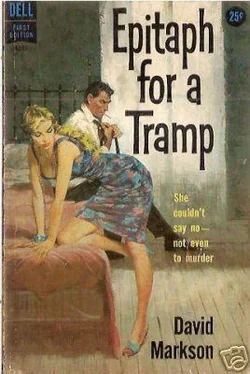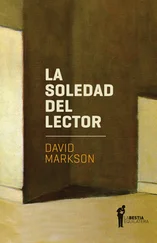“You sure you haven’t seen her in a week and a half?”
“Positive.”
“She come around here often?”
“Once a week, perhaps. A writer has to discipline his use of time. In any event there’s nothing steady about it, if that’s what you mean.”
“I gathered that inside,” Brannigan said.
“Now look, if that’s a crack—”
“Probably it was. Skip it. I don’t read books myself so I wouldn’t know what it takes to write them.”
Sommers chewed his lip, not knowing whether he could afford to get angry or not. We stood there. Two young girls passed us on the street, chattering. “That illiterate,” one of them said. “All he did was say hello and then keep shoving me into corners—”
I was taking a Camel. “I bum one of those?” Sommers asked. “I left mine in back.”
I gave him one and lit it. He nodded, hardly looking at me. He hadn’t really seen me since we’d gotten there, which I supposed explained why he liked Hemingway so much. Hemingway never sees anybody either.
“I don’t know what else to say without knowing what it’s all about,” he told Brannigan.
“That’s good enough for now,” Brannigan decided. “You’ll hear from the department again.” He had started up the stairs.
When he did get the urge to read, it patently wasn’t going to be something of Sommers’s.
“Well, for crying out loud,” Sommers said after us, “this is some deal. You come around asking all kinds of personal questions and then you—”
“You can go back in,” Brannigan said, stopping. “Your sweetheart’s probably getting edgy in there.”
“That’s none of your damned business!” Sommers had made up his mind to get sore after all. “Police. Try to be decent and what does it get you? Thanks a lot, mister.”
“You’re welcome. You’ve been a cooperative, helpful citizen. And now you can blow.”
“The hell with you,” Sommers said abruptly. “Sure, I’ve been cooperative. And I didn’t have to answer a damned one of your questions. You guys give me a royal pain. A bunch of tough, cynical, uncreative clods, what the hell do you know? What I do in my apartment is my own concern and I don’t need any comments from your end. I’m a writer and a good one, and if you want to know I spent four years in jail. Sure, lift an eyebrow when I tell you. Go back and look it up, it’s all there. I stole eleven thousand dollars when I was eighteen. Eighteen! You guys wouldn’t have had the imagination to swipe apples! Well, I did my time and I don’t owe you anything, see?”
I wondered precisely what had brought all that on. Brannigan was at the top of the steps, looking at his cigar. “Nobody said you owed us anything, Sommers,” he said quietly.
“Yeah, well, I don’t have to make any explanations about my private life either. What I do to make myself a better writer is my business. You slobs wouldn’t know an experience if it hit you in the face.”
He made a point of deliberately flinging away the cigarette I’d just given him. That was quite an approach he had toward his profession at that. I could almost visualize him at work, writing stirring exhortations in his notebook: Very important! Every Tuesday and Thursday, nine to eleven, be sure to have an experience! The vestibule door slammed after him when he whirled and went inside.
Brannigan was already walking. “Writer,” he said. “If that self-centered phony is a writer then I’m — I’m—”
“Marcel Proust,” I said. “Ducky Medwick. What the hell, you didn’t have to needle him that way.”
“Greenwich Village,” he grunted. He did not say anything else until we had gotten into the car. Then he said, “And the next one is a queer. That Neva, the photographer. And I suppose the one after that — what’s his name? That Arthur Leeds — will be a hermaphrodite. Why don’t you go the hell home and catch up on some sleep? They’ll have the body out of there by now.”
“You’re a comfort,” I said.
“I get that way.”
He cut down Seventh before turning east on Tenth Street and we passed the antique shop. The smashed window was already being boarded up. “I suppose there’ll be a suit against the city for that,” he said then. “And probably one on the accident. Causing Sabatini to flee at excess speed, some such malar-key. Maybe it isn’t Greenwich Village after all. Maybe it’s just people who make me sick.”
He was still laboring the unlit cigar. We passed the rear of the Women’s House of Detention and that gave him a few more ideas. “And right in there is where she would have wound up if she hadn’t gotten knifed. In with the whores and the junkies and the lovely little seventeen-year-old mothers who get drunk and bash their kids’ heads against the wall for crying too much. Sweating out an arraignment for driving the car on the Troy heist. Because she was bored. Because she was too sensitive to be satisfied with the middle-class way of life — is that what the bastard said it was?”
“Why don’t you shut it off, Nate? I’m the one who ought to be disgusted.”
“Are you? You don’t much seem to be. Buster Keaton I got to ride with. Just how do you feel about all this anyhow?”
“Go to hell,” I told him. “As a favor, huh? Just for me?”
Clyde Neva’s address turned out to be a six-story warehouse structure on a block taken up almost completely by the sides of large apartment buildings which fronted on other streets. The place had two entrances. One of them was a gigantic sliding-gate affair for trucks. That one was boarded up. The other one was small and newly painted, the color of a stale whisky sour. A neatly polished metal plaque in the center of it said:
Neva Portraits — Loft
The smaller door opened into a narrow stairwell with concrete fire steps and a metal handrail leading upward. There was another plaque just inside which said simply Neva, and still another on the first landing, this time with an arrow pointing upward. Underneath the third plaque someone had scrawled in lipstick: Oh, Clyde, ifl come up all thatway I’ll just never, never come down. The fire doors from the unused warehouse were barred on each landing.
The stairwell was sweltering. There was one final Neva at the top, in case someone hadn’t been paying attention, and a bell that you worked by a chain. Brannigan worked it and we heard it tinkle somewhere inside. I crushed out a cigarette, sweating.
Clyde Neva called out to us as he started to open the door, saying, “But darling, you’re so-ooo early,” and then he got a look at us and said, “But it isn’t you either, is it? I don’t know you, do I? But then that’s always so-ooo exciting! Do come in, do!”
“Can it,” Brannigan said.
“I beg your pardon?”
“Can the swish talk, we’re not buying. You Clyde Neva?”
He looked at us, pouting. He had the sort of face that was meant to pout, the kind that would have looked charming in the mirror over a lady’s dressing table while its owner plucked her eyebrows, if its owner had been a her. So it had probably looked sickening when its owner had plucked his. He was wearing rouge, and you could have hitchhiked to Rochester and back in the time he’d spent on his hair. Each tiny blond curl had been twisted into place separately, in a way which made his head look as if someone had doused it with mucilage and then dumped the contents of a bait can over it. He was wearing an orange turtleneck sweater, and the buttermilk-colored things he thought were pants were so tight that he had probably had to put them on with Vaseline.
“I said are you Neva?”
Читать дальше












